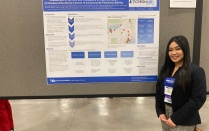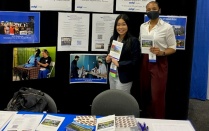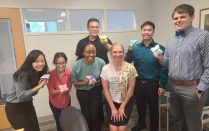Residency Training Program
Our residency programs provide postgraduate clinical training in either general (PGY1) pharmacy practice or PGY1 community-based pharmacy practice. These experiences prepare our residents for advancement within the profession of pharmacy.

Jeuel Bayawa, PharmD, PGY1 Community-Based Pharmacy Resident, UB SPPS/Middleport Family Health Center, presenting at the APhA Annual Meeting in March 2023.

L-R: Jeuel Bayawa, PharmD, PGY1 Community-Based Pharmacy Resident, UB SPPS/Middleport Family Health Center, and Samara White, PharmD, PGY1 Pharmacy Resident, UB SPPS/Buffalo Psychiatric Center, presenting at the 2022 ASHP Midyear Meeting Residency Training Program Showcase.

SPPS residents and fellows show off their wellness fortune teller creations at a wellbeing session led by Erin McKendry, Postgraduate Education Coordinator.
All of our residency training programs are accredited by the American Society of Health-System Pharmacists (ASHP).Training in a program administered by UB SPPS provides numerous advantages, including:
- complete a research project under the direction of a faculty mentor;
- complete an advanced academic teaching certificate;
- have access to a world-class, online medical library;
- receive travel support to attend a professional meeting
Our residency programs provide you with essential clinical training and leadership development to make you an integral member of the health care team.